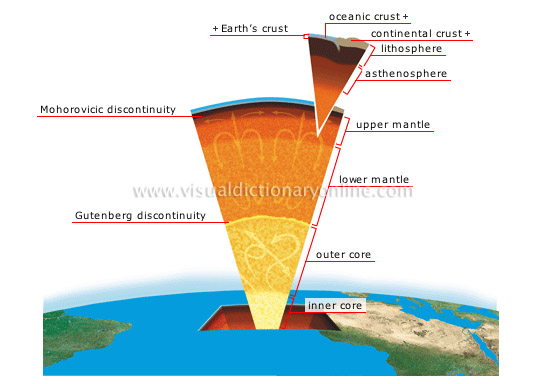structure of the Earth
The Earth is formed of three concentric layers: the core, the mantle and the crust; these are separated by transition zones called discontinuities.
lithosphere 
Layer from 30 to 60 mi thick that comprises the Earth’s crust and the solid part of the upper mantle; it is divided into tectonic plates.
continental crust 
Layer varying in thickness from 20 to 45 mi and composed mainly of granite. It forms a number of distinct landforms: the continents.
asthenosphere 
Layer of the upper mantle with a thickness of 125 mi; it is composed of molten rock, on top of which the lithospheric plates slide.
Mohorovicic discontinuity 
Zone that separates the Earth’s crust from the asthenosphere.
Gutenberg discontinuity 
Zone separating the lower mantle from the core; it is located at a depth of about 1,800 mi.
lower mantle 
Little-known layer with a thickness of about 1,420 mi; its slow-moving currents, called convection currents, are caused by temperature variations.
outer core 
Composed of molten metal, it is 1,130 mi thick; the magnetic field is caused by electric currents circulating inside the outer core.
inner core 
Composed of iron and nickel, it is subject to so much pressure that it remains in a solid state in spite of temperatures higher than 9,000°F; its diameter is 1,000 mi.
oceanic crust 
Layer forming the ocean floor; it is thinner, denser and younger than the continental crust.
Earth’s crust 
Solid layer at the Earth’s surface whose thickness varies from 6 mi beneath the oceans to 35 mi beneath the mountains.
upper mantle 
Layer of hard rock nearly 390 mi thick; it is made up of the asthenosphere and the base of the lithosphere.












